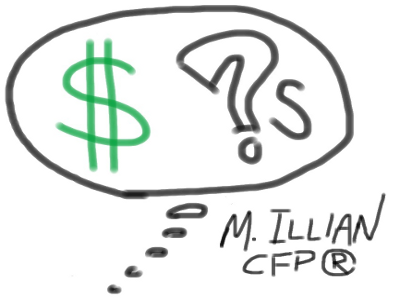
Q: It’s annual enrollment time, and my employer is now offering a health insurance plan with a $3,500 deductible and otherwise similar benefits as an alternative to our conventional HMO health plan. Our family is a bit nervous about coming up with this money, but the new plan will reduce my annual premiums by $2,000. And my employer will contribute $1,000 to my HSA account. What do you recommend I do?
Sincerely,
Medical Insurance Is Killing Me
$ ?s by Matthew Illian, CFP®
Dear Medical Insurance Is Killing Me,
The transition from a conventional health insurance plan to a Health Savings Account (HSA) and high deductible health plan is an eye-opening experience. One of every 10 patients in the United States consumes 69% of the health-care costs. The other nine would benefit from an HSA, and you may be one of them.
I applaud your employers for contributing some of their cost savings from the high deductible insurance to add to your HSA. This is how it works. An HSA is a tax-free savings account that you can use for qualified health-care-related expenses. You can use this money to make co-pays, buy aspirin or pay a doctor’s bill. And like any other bank account, HSAs come complete with debit cards and/or checks. To qualify for an HSA, you must be enrolled in a high deductible health plan (HDHP). An HDHP covers preventive health care-–like immunizations for the kids and annual checkups-–but all other expenses are subject to the high deductible.
I only recommend that you make the change if you have the discipline to put at least the $2,000 in annual premium savings into your HSA account. Including your employer contribution, you will then have $3,000 in your HSA. The first year of using an HSA and HDHP is the most challenging. You can solve the potential cash flow problem if you are able to fund the HSA up to the amount of your deductible in the beginning of the year. That way you’ll know you have the money to cover any large expenses. In following years, studies show that two thirds of accounts have funds left over, which will help cover any gaps.
I would not recommend making the switch if you aware of any large upcoming health expenses. The breakeven point in your situation is approximately $3,000. Spend less than this, and you’re better off with the HSA. If you have been putting off any major medical procedures, get those done before you make the switch. As you can see, HSAs are a big benefit for those who lead healthy lifestyles and stay out of the emergency room.
Even better, think of your HSA as a retirement savings vehicle, and plan to save the maximum deductible. Health-care costs, as a percentage of a retirees’ income, is expanding rapidly. You’ll be happy to have a pot of tax-free money to cover those costs. Additionally, families can get a federal tax deduction for HSA contributions up to $6,250 in 2012 ($3,100 for individuals). In your case, you are only eligible to deduct a total of $5,250 because your employer will be contributing $1,000 to your account.
HSAs and HDHPs create a financial incentive to spend your health-care dollars wisely. My wife and I saved thousands by shopping around for a cost-effective imaging center to perform an ultrasound during her pregnancy. And because HDHP participants are more likely to track their expenditures, these plans historically have lower cost and inflation adjustments year over year. So you can expect that your monthly premiums will rise but more slowly than those using conventional health plans.
If you have a money question that is nagging at you, please submit it using our contact page. We attempt to respond to every question. If yours is chosen for MONEY QUESTIONS, we will give you a pseudonym and let you know the date the Q&A is published.